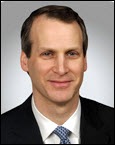The article about Pediatric Associates in CA has a nugget with a potentially outsized impact: the implication that VFC vaccines…
EMR Vendors on HITECH – Part Five of a Series
We asked several vendor executives a series of five questions related to the economic stimulus as it impacts electronic health records.
What will be the government’s ongoing involvement in healthcare IT?
Allscripts – Glen Tullman, CEO

The Government has three roles to play: providing leadership, standards, and incentives to spur utilization. So far, President Obama has accomplished all three, both through his words – highlighting the value and importance of Electronic Health Records – and through his actions – passing the Stimulus bill with the HITECH Act and substantial utilization incentives, along with a call to strengthen standards.
Healthcare reform is a front-burner issue within the Obama Administration and government in general right now. We believe that healthcare IT has a critical role to play in enabling our country to achieve many of the broad goals outlined in the Administration’s reform platform. We think of it as a necessary but not sufficient requirement for successful transformation. In other words, you can’t possibly achieve our national healthcare goals without technology and Electronic Health Records, but widespread EHR adoption alone also won’t do it – we need reform across the entire system.
We also believe HIT will continue to be central to the Administration’s forthcoming reform plans, which will be rolled out over the next few months. President Obama has indicated that, true to his campaign promises, this $19 billion investment is merely a down payment on what he sees as a large, comprehensive effort over the next several years. We look forward to being a part of his vision for improving our healthcare system with technology.
athenahealth – Jonathan Bush, CEO, President, and Chairman

I think we will continue to see various standards and functionality committees formed which is to be expected given the fast majority of the vendors in HCIT are legacy-based software vendors. That said, our hope is whatever policy is enacted wont stifle innovation, but rather create market dynamics that help further do away with the “Do-It-Yourself With Software Model” that we all know has not worked in HCIT just as we have seen software-only models in other industries parish. The software-enabled service (SeS) model should and we believe will be the dominate model in years to come – where the interface is simply the conduit by which the vendor delivers some kind of service. amazom.com writes millions of lines of code, as does your retail bank – but we pay for the book or access to the banks network not for the software.
eClinicalWorks – Girish Kumar Navani, President

It will be speculative on the part of eClinicalWorks to comment on the government’s involvement. We do not hire lobbyists or contribute to campaigns, so we are not directly involved in politics. We trust that the involvement of public and private sector will yield a balance that will be beneficial to healthcare as a whole.
Eclipsys – Tom Cooke, VP and GM of Eclipsys Practice Solutions

Eclipsys believes the government will continue to be the single largest payer and provider of healthcare in the United States. As the largest stakeholder, the U.S. Government will continue to invest in ways to create efficiency and quality. This stimulus package is not only welcomed for its financial support of HCIT, but also for fostering a culture of quality and outcomes that will help accelerate healthcare technology adoption, interoperability and collaboration among stakeholders including health systems, suppliers, and consumers. We expect the bar to continue to be raised by Federal Mandate, and continue to believe this is a good thing for our industry, and our company.
eMDs – Michael Stearns MD, President and CEO

The governments of other industrialized countries have taken a more active role than the U.S. in healthcare, with mixed results. We can learn from these lessons and allow the government to have a positive influence on healthcare while not impeding innovation. I would personally like to see the government accelerate standards efforts and fund research and consumer/provider education programs related to HIT
Greenway – Wyche “Tee” Green, President
Our President and many members of Congress clearly see that health IT, specifically EHRs, must be the backbone of a 21st century healthcare system and that these components are essential to implementing any type of healthcare reform. We see the government fulfilling this process and providing the up-front incentives that will fuel our country’s long overdue modernization of our healthcare system.

MED3OOO – Jay Anders, M.D., Chief Medical Information Officer

For the foreseeable future, government will take an ever-increasing role in healthcare IT. There is just too much money at stake. Transparency in the form of physician and hospital ratings and rankings will be commonplace and available on the CMS website for review. Within the current language of the stimulus bill, physicians and hospitals that receive incentive funds will have their names, addresses, and phone numbers published on the CMS website. You will see CMS expand what they report on physicians and hospitals as they gather meaningful data on healthcare cost and quality metrics.And, of course, government will continue to set standards as to the functionality and interoperability of HIT systems. They will be the watchdogs of privacy, and will continue with oversight and standards relating to how patient identifiable information should be shared and communicated.
Medsphere – Mike Doyle, CEO

At this point, we know that government involvement in healthcare is going to increase. And unlike the mood of roughly 15 years ago, when the Clintons attempted to overhaul healthcare, many in the industry are now amenable to and involved in trying to restructure our system. Medsphere views that as a good thing, and thinks the initial attempts by the Obama administration to involve stakeholders in the process have been positive.
How government involvement will play out exactly is unknowable at this point. However, it seems obvious to us that they should do certain things. Why waste the investment in VistA? Preserve that tremendously useful tool and propagate it to other sectors of the government–the DoD, for example. In our view, the use of VistA falls within the fiscal responsibilities of government. Beyond that, the government needs to ensure that the EHR systems in U.S. hospitals are interoperable, cost-effective and clinically proven to improve patient outcomes. This is a pivotal time in healthcare due to the critical mass regarding electronic health records and the Obama stimulus package. We can’t waste this opportunity.
NextGen – Patrick Cline, President

Government money generally brings along with it some form of government involvement. Whether that means certification, process oversight, benchmarking or a more hands-off approach remains to be seen. We do feel strongly that government’s role is not to be in the business of healthcare IT, but rather to support healthcare IT by providing significant incentives to healthcare providers that implement the right systems.
We also feel strongly that significant care must be taken regarding how the stimulus monies are controlled and dispersed. Nearly every day, we hear of new “ventures” or schemes aimed at “getting at” the healthcare IT stimulus monies. Many will try to disguise themselves as “trusted third parties” that, if given significant sums of money, will do the right things with it. Our administration needs to be very careful here. Except for certain legitimate grants, the majority of funds directed toward the adoption of electronic health record systems need to go directly to healthcare providers for meaningful use of the systems.
We think NextGen Healthcare has consistently demonstrated an ability and eagerness to lead the industry with respect to compliance with government-supported standards and initiatives, from HIPAA to CCHIT certification and more. We intend to aggressively comply with every set of HIT criteria that the government determines it needs to promulgate.
QuadraMed – Keith Hagen, President and CEO

We expect that the government will only become more involved in healthcare IT over time. First of all, there is still a great deal of work to be done on the standards front. The holy grail of semantic interoperability of data between systems is still way out there. The idea of sustainable Health Information Exchanges is not a reality today. That will take government involvement to try to get what is essentially a competitive market structure to behave more cooperatively. Finally, we expect cost pressures to only increase – we expect pay for performance regulations to only increase. Providers will continue to need IT to not only survive but thrive in the new regulatory environment.
Sage – Lindy Benton, Chief Operating Officer

The United States government is the largest healthcare payer and the healthcare outlay continues to rise. While levels of involvement may fluctuate depending on political will, it’s conceivable the government will play an increasing role in catalyzing the use of IT and analytical tools – significantly to unleash data necessary to manage the quality of delivery of care, reduce waste and errors in focused areas, and to assess the use and effectiveness of protocols and interventions.
SRSsoft – Evan Steele, CEO

The government should encourage physicians to adopt healthcare IT that will provide them with tools to increase productivity and improve quality of care—tools that they will embrace. Otherwise, we will face backlash from doctors and continued disappointing EMR-adoption rates.The perfect storm is brewing—aging baby boomers, a greater number of insured individuals, retiring baby boomer physicians, and a shortage of physicians graduating from medical school. In the face of this increasing demand for care and decreasing supply of providers, we cannot push physicians to adopt old-school EMR technology that compromises their productivity.
Industry stakeholders and the government must reevaluate the EMR landscape to promote products that actually make physicians and, therefore, the entire health system more efficient. As President Obama said in his recent health summit, “Every voice has to be heard. Every idea must be considered. . . . I just want to figure out what works.”

Girish’s comment?
Dr. Anders, you scare me.